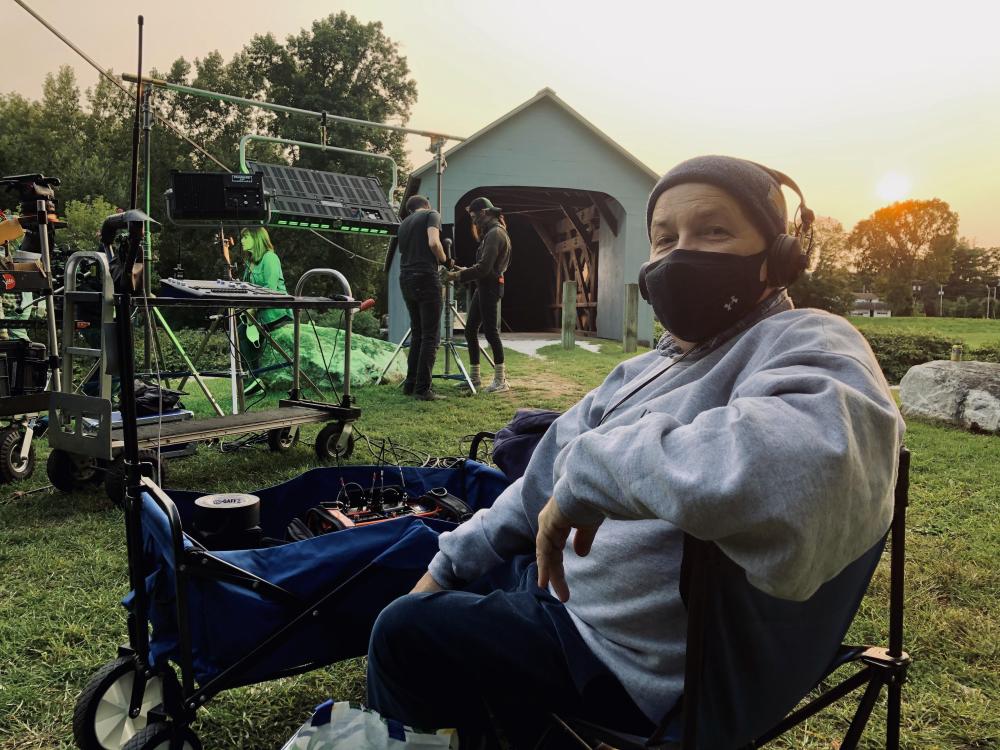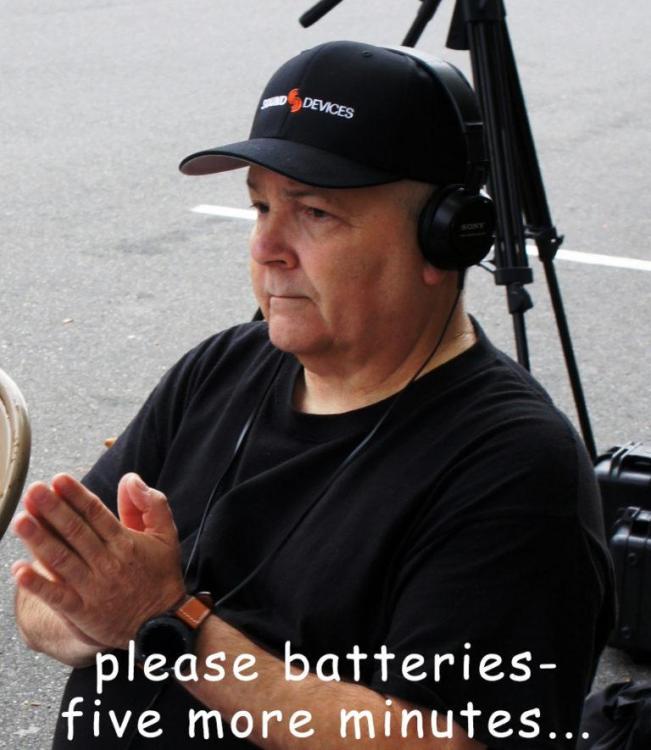Search the Community
Showing results for tags 'Work'.
-
I’ve always enjoyed looking at images taken on location. Do you have any images of you working sound on location? Please share a couple of your photos. On the set of “Rejected”, 2020, Sheffield, MA. Has anyone else been here?
-
Hey all My wife is a producer and is coordinating some interview shoots for a client in several locations across the country taking place in late August through early October. She's seeking sound mixers in Seattle, Denver, Black Hills SD, Huntsville AL, and Athens GA. If you're a mixer in any of these areas and are interested, please email her at jbaroody@earlylightmedia.com. Thanks! Steve
-
Just recently started my Staff Me Up profile, and was wondering if anybody on here might mind voicing their thoughts on it? As someone who's trying to establish themselves in this business and therefore needs to find work, it'd be great to hear the good the bad, and everything in between. Is it a good place to find work, or at the very least a good alternative to Craigslist? Interested to hear your thoughts. Cheers!
- 19 replies
-
Breaking into the business... How can I get my feet wet?
Alex T posted a topic in General Discussion
Hey guys, Newbie here. I am a non pro that got into sound because a friend wasn’t technical at all. I work I’m IT, so love anything technical/electrical and jumped at the opportunity to learn/do something new. Fast forward almost a year later, and I have a modest little sound kit and am hooked! So here’s my question. How would I go about getting some real world experience and maybe actually making a few $$$ in the process? I have zero set/pro experience and am dying to get my feet wet. Any suggestions will be much appreciated!!! -
Article in today's NYTimes about FBI trying to get info on some Indonesian "producers" who solicit US film people - above and below the line - to work on a gig there. Apparently they're faking everything very wel and research their victims, eventually getting the victim to front money for the trip and then shell out fees and inflated exchanges to locals who are in on the deal. Underlying FBI press release here, dated 7/15. They want to hear from anyone who's been contacted by the scammers. I suspect experienced soundies who have work here won't be tempted. But I also know that's not everybody on JWSound.
-
Hello, I'm Vincent, a french sound mixer. Working since 5 years on location sound, and I'm always asking my self, how does it work on the other side of atlantic. I mean, how do you find your jobs, is that hard ? And whats about salary ? I'm thinking of moving, to Vancouver, BC, in the future. What's your thought about this ? Is my work experience will count ? or should i start as an sound utility (job that like too of course). Or maybe i should start on a rental house to build a network. Thanks for your answers fellows. Greetings from Paris. Vincent
-
Hello Guys, I was curious if any of you non union guys have any experience with working with a booking agent to help you find work. If you have I would love to hear more about with your experience. It seems like it could be a great thing but I'm not even sure if its a thing but I hope to hear from you! Dan
-
I have been blessed to be a member of the local for 43 yrs. Ny son, Nick, a seasoned boom/utility needs a week of work by Nov. 20, 2015, in order to be insured. His cobra ends in Jan. i would be grateful if any of you guys can help him out. 818-261-1521 rarc51@aol.com Clark King
-
Hello all! My name is John Harton and I'm a recently graduated Sound Design student from the Savannah College of Art and Design. My wife and I are moving up to Atlanta after I get back from a gig in CA in about three weeks and I wanted to put myself up if anyone needs a boom operator or utility. I'm looking to ultimately get into narrative work and also recently wrapped my first feature as a boom op ("Christine" which shot in Savannah). I'll be at the ATL sound mixer mixer at the end of the month, but if anyone has work they need help with or have to pass up, I'd appreciate any and all the help I can get! Can't wait to get involved in the Atlanta sound community, from what I hear the sound crews of middle Georgia rock a mic like none other! Feel free to PM or call at 970-two three two- 6840 . Cheers!
-
Just wondering what everyones experience is with Production Hub in finding jobs/ getting calls. Has it been worth it to pay for being featured instead of the free listings?
-
Hello all, I recently discovered this forum and am learning new techniques/knowledge each time I log on and read. I wanted to reach out and ask for any advice anyone can lend? I'm based out of Austin, Texas and have primarily worked on shorts, several independent feature films, a couple of feature documentaries and am looking to take that next step up the metaphorical job pole that is the film industry. I'm a hard, disciplined worker who is always willing to learn new and innovative ways to capture the best audio possible. If anyone in the Austin/Central Texas area is in need of a boom operator or a sound assistant, I would greatly appreciate any and all who reach out to contact me. Thanks!
-
There are few modern relationships as fraught as the one between art and money. Are they mortal enemies, secret lovers or perfect soul mates? Is the bond between them a source of pride or shame, a marriage of convenience or something tawdrier? The way we habitually think and talk about these matters betrays a deep and venerable ambivalence. On one hand, art is imagined to exist in a realm of value that lies beyond and beneath mere economic considerations. The old phrase “starving artist” gestures toward an image that is both romantic and pathetic, of a person too pure, and also just too impractical, to make it in the world. When that person ceases to starve, he or she can always be labeled a sellout. You’re not supposed to be in it for the money. On the other hand, money is now an important measure — maybe the supreme measure — of artistic accomplishment. Box office grosses have long since become part of the everyday language of cinephilia, as moviegoers absorb the conventional wisdom, once confined mainly to accountants and trade papers, about which movies are breaking out, breaking even or falling short. Multimillion-dollar sales of paintings by hot new or revered old artists are front-page news. To be a mainstream rapper is to have sold a lot of recordings on which you boast about how much money you have made selling your recordings. Everyone might be sure that sales are not the only criterion of success, but no one is quite certain what the others might be, or how, in our data-obsessed era, they might be measured. In the popular imagination, artists tend to exist either at the pinnacle of fame and luxury or in the depths of penury and obscurity — rarely in the middle, where most of the rest of us toil and dream. They are subject to admiration, envy, resentment and contempt, but it is odd how seldom their efforts are understood as work. Yes, it’s taken for granted that creating is hard, but also that it’s somehow fundamentally unserious. Schoolchildren may be encouraged (at least rhetorically) to pursue their passions and cultivate their talents, but as they grow up, they are warned away from artistic careers. This attitude, always an annoyance, is becoming a danger to the health of creativity itself. It may seem strange to say so, since we live at a time of cultural abundance and flowering amateurism, when the tools of creativity seem to be available to anyone with a laptop. But the elevation of the amateur over the professional trivializes artistic accomplishment and helps to undermine the already precarious living standards that artists have been able to enjoy. “Making a living is nothing,” the novelist and critic Elizabeth Hardwick wrote in an essay titled “Grub Street: New York,” first published more than 50 years ago in the inaugural issue of The New York Review of Books. “The great difficulty is making a point, making a difference — with words.” She might just as well have said with images, sounds or the movement of bodies; words just happened to be her chosen medium. And her words in this case still stand as a concise, slightly scolding credo for the creative class. Nobody cares how you pay your rent. Your job is to show us something we didn’t know we needed to see. But it is, nonetheless, a job. The risk in separating the labor of making points and differences from its worldly reward lies in losing sight of the fact that it is labor, and therefore has a value that is material as well as abstract. In March, the National Endowment for the Arts released a report estimating that more than two million American workers identified themselves as artists, and noted that they had, since 2008, undergone the same bumpy, piecemeal recovery as other workers. An earlier report, from 2011, calculated that “the production of arts and cultural goods and services contributed $504.4 billion to the U.S. economy,” or 3.25 percent of gross domestic product. It may be relevant to note that the single largest category of artistic endeavor was advertising — a sign, perhaps, that the distinction between art and commerce is finally moot — but the upshot is that what artists do represents a significant quantifiable share of the nation’s wealth. The question of who profits and who gets paid has become a contentious one. The cultural economy has always been mixed — a volatile blend of bazaar, bureaucracy and medieval court. Some parts of it appear, at least at first glance, to function by the rules of the free market. In reality, of course, this activity — represented by quaint, in some cases obsolescent institutions like the bookshop, the record store and the movie theater — has been governed by a complex web of middlemen and corporate players: agents, producers, movie studios, publishing houses, record companies and so on. That capitalist enterprise zone exists alongside, and in practice frequently overlaps with, a realm of patronage. Individual artists subsist on grants from foundations and the government, which along with corporations and wealthy donors support the institutions that bring those artists’ work to the public. When you buy your ticket and walk into a museum, a regional theater or a symphony hall, the experience you are purchasing has been subsidized by the philanthropists whose names are listed in the lobby. And nearly every artist who makes a living (perhaps outside of advertising agencies) does so in this nexus of peddling and patronage. The recently published anthology “MFA vs. NYC” proposes, in its title, a dichotomy between the two dominant models of literary careerism: the subsidized route of graduate school and teaching, in which writers support themselves through paid activities other than writing; and the rough-and-tumble marketplace of New York City, where writers more or less do the same thing but with a different attitude. New York, as the headquarters of the publishing industry, the domestic art market and segments of the television and movies businesses, shines with the credentializing luster of capitalism. Of course, making it here is costly enough to require other forms of paying work, or parental subsidy. The academy offers a degree of security, along with time and space to work, but can also be, in the age of the adjunct instructor, a place of alienation and exploitation. The argument that threads through many of the essays in “MFA vs NYC” is that both creative business models are, in the jargon of the moment, being disrupted, as technological and economic forces combine to exert downward pressure on writers’ incomes. The signs of this disruption are not hard to find. Magazines that once paid by the word and employed healthy rosters of staff writers are now recruiting readers to contribute articles, offering to compensate them with exposure and “prestige.” Digital music services like Pandora and Spotify pay minuscule royalties to artists whose songs they stream. Meanwhile, in the nondigital domain of musical performance, symphony orchestras and opera companies have undergone several seasons of labor trouble, as managers from Minnesota to the Metropolitan Opera cite sluggish ticket sales and stagnant endowments and try to wrest salary and benefit concessions from unionized rank-and-file musicians and singers. In the years since, the big score has been realized by technology and social media companies, which have enticed users to generate content for nothing. “If there’s something that you want to hear/You can sing it yourself,” Ms. Welch sang. The subsequent history of the Internet has turned this “Atlas Shrugged”-like idea on its head, enshrining democratic amateurism as a cultural norm and a Utopian possibility. We can all do it anyway — make our own videos and songs, write our own poetry and personal essays, exhibit our paintings and our selves — even if it doesn’t pay. Digital amateurism also sells itself as an alternative route to professional riches. Competitive reality television, Kickstarter campaigns and cooperative self-publishing ventures offer the lure of fame and fortune accomplished without the usual middlemen. The idea that everyone can be an artist — making stuff that can be shared, traded or sold to a self-selecting audience of fellow creators — sits awkwardly alongside the self-contradictory dream that everyone can be a star. The result is, or threatens to become, a stratification that mirrors the social and economic inequality undermining our civic life. A concentration of big stars, blockbusters and best sellers — Beyoncé, “The Avengers” and their ilk — will sit at the top of the ladder. An army of striving self-starters will swarm at the bottom rungs, hoping that their homemade videos go viral, their self-published memoir catches fire or their MFA thesis show catches the eye of a wealthy buyer. The middle ranks — home to modestly selling writers, semi-popular bands, working actors, local museums and orchestras — are being squeezed out of existence. The middle — that place where professionals do their work in conditions that are neither lavish nor improvised, for a reasonable living wage — is especially vulnerable to collapse because its existence has rarely been recognized in the first place. Nobody would argue against the idea that art has a social value, and yet almost nobody will assert that society therefore has an obligation to protect that value by acknowledging, and compensating, the labor of the people who produce it. And artists themselves, outside of unionized industries like television and movies, are unlikely to perceive defending the value of what they do as an interest they hold in common. But it is not necessarily in their nature to be any more individualistic or competitive than anybody else, and they may have a lot to teach the rest of us about the meaning of work. If the supposedly self-involved members of the creative class can organize to assert some control over what they make — the magical stuff now routinely referred to as “content” — then maybe other residents of the beleaguered middle might be inspired by their examples. Inexpensive goods carry hidden costs, and those costs are frequently borne by exploited, underpaid workers. This is true of our clothes and our food, and it is no less true of those products we turn to for meaning, pleasure and diversion. We will no doubt continue to indulge all kinds of romantic conceits about artists: myths about the singularity of genius or the equal distribution of talent; clichés about flaky, privileged weirdos; inspiring tales of dreamers who persevered. But we also need to remember, with all the political consequences that this understanding entails, that they are just doing their jobs. http://www.nytimes.com/2014/05/11/movies/the-paradox-of-art-as-work.html?hp&_r=0
-
Hello, Everyone!!! My name is Scott Harnell and I'm in the beginning stages of a career in production sound for film and television. I've been doing my homework (read Location Audio Simplified and Location Sound Bible, as well as lots of posts on the JWSound forums) and have started slowly putting together my kit. Now, I'd really like to gather first-hand experience from a seasoned professional. So far, I've worked on two professional gigs. The first was the official webcast of the Formula Drift event at Road Atlanta last year and the second was a documentary on the Atlanta Police Department's first sketch artist. At the Formula Drift event, I helped load and unload all of the gear, ran and gathered cable, placed spot mics for tire and engine noise, and was essentially a PA and sound utility in one. My experience on the documentary had me sitting solo at the sound helm, wiring the subject with a lav, and mixing. If you'd like some help, I'd love to assist you on any of your future projects in any way possible. I'd be willing to load and unload gear, get your coffee, check your batteries, wrangle your cables, or just be a gofer. If presented with the opportunity, I'd be most professional, invisible/silent, and make it a point to never be in the way, seeking only to facilitate a smooth and efficient shoot. If you could use some help, or would want to get some coffee or lunch to see if you'd be interested, please feel free to reach me at 404-218-3155 or scottharnell@gmail.com. Thanks in advance!
-
There's a chance I might be moving to Vancouver, B.C. this year. I'm looking to get an apprenticeship in location audio. I've worked on a number of small indie shorts on this side of the pond where I was basically a one man sound department, so I'm quite the newbie. Any advice from folks working in the industry in Vancouver? I'd like to get some experience in a larger production to get an idea how everything works. Does the sound department take on people to help out during the shoot?
- 4 replies
-
- Apprenticeship
- Work
-
(and 4 more)
Tagged with:
-
Hello all, I am an Orlando sound mixer and have been working in Florida since 1995. I have recently upgraded my ENG package to a Zaxcom Nomad 10 package. I have a pretty decent package to accommodate a wide variety of productions. Pretty much trying to network any work so I can pay for all the money I spent on it. I work great with any kind of crew and I have many people in the Orlando market that can vouch for my work experience and work ethic. Would love to work outside of Florida as well, if the stars align right (It's difficult to do jobs outside of Florida when they want to pay as a local. But, how do the other guys do it?). I'm also open to work with another sound mixer as boom operator. It's actually my favorite thing when it comes to major jobs like commercials. Alex Ginzo 321-202-0676
- 22 replies
-
Hey guys This is my first step into the sound and recording industry, having studied it for years at college I want to pursue a career within it. I am currently in London, England and want to be taken under someone's wing or given the right opportunities to be able to get where I want. If anyone has any opportunities or links into the media world it would be greatly appreciated. Thanks
-
Hello, my name is Stephen. I'm a sound guy from Chicago. I just recently moved to Los Angeles and have been looking to meet mixers and sound guys. I've been in the business for three years, have my own gear and have experience in commercials, tv, features, shorts and web videos. Would love to take about sound with people in Los Angeles area. I'm just getting my feet wet, so any suggestions or leads would be helpful, thanks so much for your time!
- 6 replies
-
- los angels
- sound
-
(and 2 more)
Tagged with:
-
Hey guys, Just wondering how different people charge for Post Production services? (And Also so Musical Composing services) (At home people, projects studios, studios, etc.) Anybody do a black$/min fee? A general estimated based on the amount of time you estimate it will take? Hourly work? Think it is better to separate the music and audio component on the invoice? Any input would be appreciated Thanks Guys
- 5 replies
-
- Post Production
- Money
- (and 8 more)
-
Hey guys, this might sound like a stupid question, but it's one I'm still trying to understand: Why are some projects union and some non-union? To me, the benefits of a union (to production) is the high level of skill, the organization and it's regulations and standards, and the overall dependability. So I wonder, Is it always a choice for the production to go union or non union? And therefore just generally understood that if you want to make large budget feature or tv show that you go union? What, if anything, allows a (for example) reality TV show to hire non union? And what, if anything, stops a big budget production from being non union? Thanks guys!
-
Hi! The Swedish national Public Service Television channel is about to go down to Berlin to make a show between the 12th and 19th of december, and they can't afford to bring a swedish soundie... Why, I don't know. Anywho, if you want a chance on this job, please PM me or post here and I'll bring on the information. I myself have no idea of what the job actually entails, what gear to have and what the rate is. I saw an ad on the Swedish freelance register and I thought I'd post it on here. Cheers!















